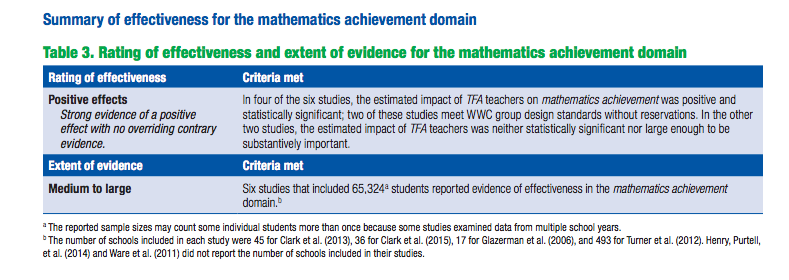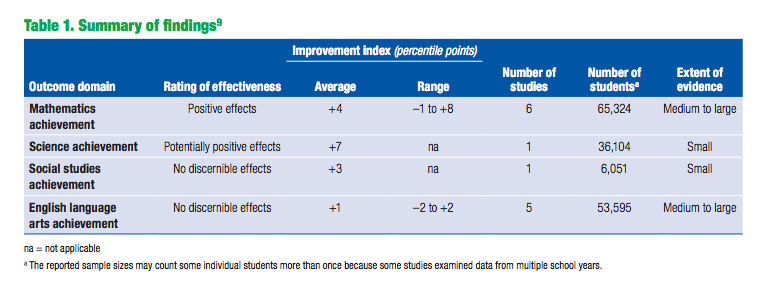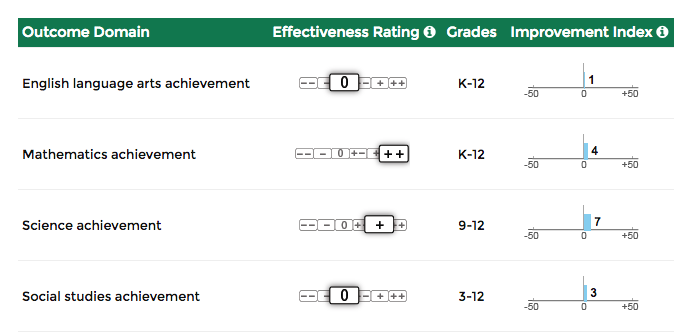The Institute of Education Sciences’ What Works Clearinghouse recently released a systematic review of all the research on Teach for America (TFA).
What Works Clearinghouse (WWC) is a place where educators can go to determine if programs are scientifically proven to work. It’s a helpful tool for all those educators who wondered, “Does this actually work?”
From their website:
The What Works Clearinghouse (WWC) reviews the existing research on different programs, products, practices, and policies in education. Our goal is to provide educators with the information they need to make evidence-based decisions. We focus on the results from high-quality research to answer the question “What works in education?”
WWC doesn’t just review any type of research reports that are thrown out there. Studies have meet certain scientific requirements to be added into a systematic review of the subject at hand.
This current review looked at TFA’s effectiveness in math, science, English, and social studies achievement.
Overall Effectiveness
Let’s start out with an overall look at the effectiveness of TFA teachers. Afterwards, I will break down the individual subjects achievement data. As you can see below, TFA teachers are better than traditionally trained teachers in math achievement, potentially better in science achievement, and are the same in social studies achievement and English achievement. The systematic review did not find a pattern of TFA teachers being worse than traditionally trained teachers in any subject.
Math Achievement
According to this systematic review, TFA teachers see the great achievement with math. The studies involved look at over 65,000 students and found TFA teachers had a statistically significant positive effect on math achievement. The review found a medium to large amount of evidence for this claim.  Science Achievement
Science Achievement
For science achievement data, the one study included over 36,000 students and found a positive and statistically significant effect of TFA teachers on science achievement.
The one study included in this section found no statistical significant effect on TFA teachers in regards to social studies achievement. This means that TFA teachers were the same as traditionally trained teachers when it came to their student’s social studies achievement.
For English achievement, the systematic review looked at 5 studies that included over 53,000 students. They found that there was no statistically significant effect of TFA teachers compared to traditionally trained teachers. TFA teachers and traditionally trained teachers were the same when it came to English achievement.
TFA teachers do better in math and science achievement, but do no worse in English and social studies achievement compared to traditionally trained teachers. The takeaway is that TFA teachers, with limited amount of training, are doing the same or as better as teachers who spend years in training.
For more on education politics and policy in Tennessee, follow @TNEdReport.






Good for them for the short-term statistical significance they have on Math and the small extent of evidence linked to Science. I wonder what the data would look like if data were analyzed that compared teachers from traditional programs with the same amount of experience. I understand that you’re wanting to promote what appears to have an impact on increased student outcomes, and, at the same time, there is a drastic difference between comparing the results of teachers that only teach short-term vs. those that stay in the classroom for significantly longer periods of time. The question is were similar data sets compared? That type of data analysis appears to have been omitted from your report.
“After five years, 27.8% [of TFA teachers] were still in teaching. This retention rate is markedly lower than the 50% estimated for new teachers across all types of schools (Smith & Ingersoll, 2003).”
http://www.edweek.org/ew/articles/2011/10/04/kappan_donaldson.html
I have little to say other than “hmm” and agree with the comment above. As we have come to know with regards to Government studies they are outsourced to think tanks and other agencies that often have an agenda. They are not required by law to provide the conflicts of interests by those who conduct the studies only who often funds them in regards to their work. So I take this with a grain of salt and wonder who they studied, how big the cohort was, the demographics and other particulars that would provide the data for the study. Studies are only good when they are large, comprehensive and comparative, and something tells me this was not.
This was more of a meta-analysis type of study. They took already existing data and then combined the data to see what the overwhelming results are. Some of these studies looked at thousands of students. The report is linked in the post and you can go look at the individual articles yourself. They combined results from multiple studies that looked at over 65,000 students. That’s a large cohort.
Explain this then
https://nonprofitquarterly.org/2015/09/11/after-25-years-teach-for-america-results-are-consistently-underwhelming/
Pingback: Teacher Colleges, We Need You to Step Up – Philly's 7th Ward
As an English Educator and Reading Specialist, I find it troubling that TFA teachers and traditionally trained teachers are neck-in neck in English achievement. Failing to invest in literacy teachers, literacy and reading instruction in teacher education programs as well as significant literacy professional development for all K-12 teachers has cost the nation immensely. Literacy and reading instruction should drive all other content preparation. How can students “be” anything, when they can’t access the texts they need?
There is a difference between expert and novice skill sets. When TFA corps members were assigned to my urban turnaround high school, we had a lot of student schedule changes that first month. The end result was the unqualified, uncertified, TFA “corps members” were assigned the students that required little more then a textbook. While the more challenging students were warehoused and assigned the experienced veteran teachers who knew what they were doing! Students would appear at my door to tell me the corps member was in tears at their desk! Fights in those TFA run classroom were a daily occurrence. Those corps members who left throughout the year were replaced by substitute teachers who had more qualifications! Not 1 of the corps members had a sick day left by the end of the year! Of course these are the anecdotal observations that never appear in the “data.” TFA is nothing more then a teacher temp agency. These corps members would never be hired as the “teacher of record” in a toney suburban school district.
Like you said, those are just anecdotal evidence. In my school, the TFA teachers teach the same students as everyone else. They teach EL students and SWDs. The TFA teachers in my building are highly regarded for using SEL components and building relationships with students. Some see the most growth in our school, and most are still teaching past their two years with MA degrees from one of the best education programs in our state that have paired with TFA. They truly are an asset in our building.